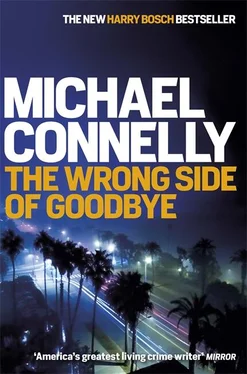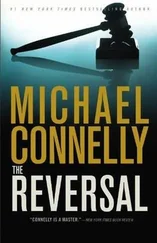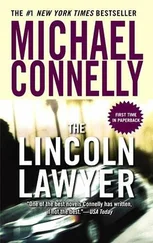He was forty yards from the house when he heard his name called from behind. He turned to find Sisto running to catch up.
“What are you doing?” he said.
“Going to search the wash,” Bosch said.
“For Bella? Then I’ll help.”
“What about Dockweiler? Who’s going to the hospital with him?”
“I think the captain. But it doesn’t matter. Dockweiler’s not going anywhere. I heard the EMTs talking. They said a bullet mighta cut his spinal cord.”
Bosch thought about that for a moment. The idea that Dockweiler might survive and finish his life in a wheelchair invoked no sympathy in him. What Dockweiler had done to his victims — including Bella, though Bosch didn’t yet know exactly what Bella had suffered at Dockweiler’s hands — disqualified him from ever earning anything like compassion.
“Okay, but we’ve gotta move quickly,” Bosch said. “Once the shooting team gets here, I’m out. We all are.”
“So what do you want me to do?”
Bosch reached into his pocket. He still had the flashlight he had grabbed off the front lawn as backup. He turned it on and tossed it to Sisto.
“You go one way and I’ll go the other.”
“You think she’s tied up to a tree or something?”
“Maybe. Who knows? I just hope she’s alive. When we get down there, we split up and look.”
“Roger that.”
The men continued down the slope. The wash was little more than an overgrown ravine that was left undeveloped because of the potential for flooding. Bosch guessed that most days it was a creek but during storms it could become a river. They passed signs warning of flash flooding during rainstorms, signs meant to keep kids from playing in the wash.
As the slope started to level off, the ground was softer and Bosch noticed what looked like a track worn into the pathway. It was no more than six inches wide and three inches deep and he followed it all the way to the water’s edge. Before splitting from Sisto he crouched down and put his light into the mini-trench. He saw what looked like a tire tread.
Bosch raised the beam of his light and followed the track to the shallow waters of the wash. The water was clear and he could see to the bottom. He saw what looked like gray sand in places, large chunks of gray rock in others. Some of the flat polished edges were the giveaway. It was concrete that had been formed and hardened and then broken. It was construction debris.
“Harry, come on, are we going to look for her?” Sisto asked.
“Just hold on a second,” Bosch said. “Be still.”
Bosch turned off his light and stayed at the water’s edge. He thought about what he had seen and what he knew. The concrete rubble. The guns and supplies. The wheelbarrow and the hand truck stolen from Public Works. The hot food on the front seat of the truck. He realized what Dockweiler had been up to and what he was doing at the tailgate of his truck earlier that night when the chief’s phone interrupted him.
“Dockweiler’s been building something,” he said. “He was taking wheelbarrows of concrete and dirt down here and dumping it in the wash.”
“Okay,” Sisto said. “What does that mean?”
“It means we’re looking in the wrong place,” Bosch said.
He abruptly stood up and turned his light back on. He turned and looked back up the slope toward the kitchen lights of Dockweiler’s house.
“I had it wrong,” he said. “We have to go back.”
“What?” Sisto asked. “I thought we were going to—”
Bosch was already running back up the slope. Sisto stopped talking and started following him.
The climb back up winded Bosch and he was moving at a modest trot by the time he was passing by the house. Through the windows of the sunroom he could see men in suits and knew that Sheriff’s investigators were now on the scene. He didn’t know if they were members of the Officer-Involved Shooting team and didn’t stop to find out. He saw Chief Valdez with them. He was gesturing and pointing, most likely giving them the initial rundown of what had happened.
Bosch continued down the side of the house and into the front yard.
There were now two Sheriff’s patrol cars and one plain wrap parked out front, but everybody was apparently inside. Bosch went straight to the back of Dockweiler’s pickup and started pulling out the two-wheeled hand truck. Sisto caught up with him at the back of the truck and helped him lower the heavy cart to the ground.
“What are we doing, Harry?” he asked.
“We have to move those boxes in the garage,” Bosch said.
“Why? What’s in them?”
“Not what’s in them. What’s under them.”
He pushed the cart toward the garage.
“Dockweiler was about to take this out of his truck and start moving these boxes,” he said.
“How come?” Sisto asked.
“Because he had hot food in the truck and wanted to deliver it.”
“Harry, I’m not following.”
“That’s okay, Sisto. Just start moving boxes.”
Bosch attacked the first row of boxes with the hand truck, sliding its blade under the bottom box and then tilting the cart and the column of boxes back. He quickly backed out of the garage and to the front of the pickup. He placed the column down, yanked the hand truck back, and quickly went back for more. Sisto worked with only his own muscles. He moved two and three boxes at a clip, stacking them out on the driveway near the pickup.
In five minutes they had made a large inroad into the stacks, and Bosch came upon a rubber mat that covered the floor and was designed to be used to catch oil from the vehicle parked in the garage. He used the hand truck to move a few more stacks of boxes and then reached down and rolled back the mat.
There was a round metal manhole cover flush with the concrete floor. It had the seal of the city of San Fernando embossed on it. Bosch crouched down and put two fingers into what looked like air holes and tried to pull up the heavy metal plate. He couldn’t do it. He looked around for Sisto.
“Help me with this,” he said.
“Hold on, Harry,” Sisto said.
He disappeared from Bosch’s view and was gone for a few seconds. When he came back he had a long iron bar bent into a handle on one end and a hook on the other.
“How the hell did you find that?” Bosch asked as he got out of the way.
“I saw it on the workbench and wondered what it was for,” Sisto said. “Then I figured it out. I’d seen the guys from Public Works using them in the street.”
He fit the hook into one of the holes in the iron plate and started pulling it up.
“That’s where he probably stole it from,” Bosch said. “You need help?”
“I got it,” Sisto said.
He hoisted the manhole out and it clattered onto the concrete floor. Bosch leaned over the hole and looked down. The overhead light in the garage revealed a ladder leading into darkness. Bosch went over to the stack of boxes where he had seen the light sticks earlier. He yanked open the box and took out several. Behind him he heard Sisto yell into the hole he had opened.
“Bella?”
There was no response.
Bosch returned and started opening the sticks, snapping them on and dropping them down the hole. He then started down the ladder. The descent was no more than ten feet but there was no last rung on the ladder and he almost fell as he placed his foot where the rung should have been. He lowered himself the rest of the way and then reached into his back pocket for the flashlight. He turned it on and played it against the concrete walls of a chamber that was still clearly under construction. There were iron supports and plywood molds for concrete. Plastic sheeting hung from makeshift scaffolding. There was air but not enough of it. Bosch found himself on the verge of hyperventilating as he gulped for oxygen. He guessed that an air-cleaning and — filtration system was not in place or not operating. The only fresh air entering the chamber was from the opening above.
Читать дальше












